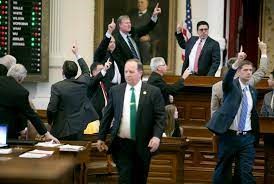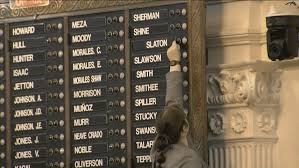
The legislative session has completed its 17th week. 2 weeks to go. Here’s what’s happening:
House Reaches Key Deadline

Thursday midnight was a critical late session deadline. All House bills – those filed by House members originating in the House – had to be considered on the floor before midnight or they were declared dead. The House started the day with a 28-page calendar, an estimated 200+ bills to be considered. When the clock struck midnight, roughly 150 of those were still on the calendar awaiting consideration. Hence, they were declared dead at that point. Democrats in the House used a delay tactic called chubbing – where members question bill authors and raise procedural questions to try and slow down the progress of the calendar. The House calendar contained several measures related to restricting transgender care and loosening of gun laws that the Democrats were determined to see killed. By and large, the Democrats were able to kill some of the Republican priorites that were set on yesterday’s calendar. But, most of the Speaker’s and his party’s legislative agenda have already passed the chamber. Moving forward, the House will now only be able to consider bills that have come over from the Senate, including vouchers, property tax reform, public school curriculum, and restrictions on drag shows and other transgender related issues.
Rep. Bryan Slaton Expelled

For the first time since 1927, Texas House members have expelled one of their sitting members. Rep. Bryan Slaton, a Republican from Royse City, was expelled on Tuesday, one day after he resigned from the House. The House General Investigating Committee recommended moving forward with the expulsion even though Slaton had resigned because when a member resigns, they are still considered a member until a successor is sworn in. Without the expulsion, Slaton would have been entitled to his salary, per diem, and all other benefits afforded to a sitting House member.
The General Investigating Committee found that Slaton had supplied alcohol to a 19-year-old Capitol intern and had sex with her after she became intoxicated. Furthermore, he sent her threatening emails insisting that she keep the incident quiet. The full House voted 147-0 to expel Slaton.
Slaton was in his second term, is a former youth pastor that now works in a small family investment firm. He was a vocal opponenet of the LGBTQ community and has potrayed himself as a family values conservative. A special election will now be called to fill the vacancy.
Raise the Age Gun Legislation

On Monday night, in a surprising turn of events, the House Select Committee on Community Safety approved legislation to raise the minimum age from 18 to 21 to purchase AR-15 style rifles. This was the weapon used in the Uvalde school shooting last year, and the bill had become the top priority of the families of the school shooting victims. The families had been advocating for this legislation during the entire session, and made one final plea to House members on Monday to take a vote in committee. Monday was the final day that House committees could approve bills that originated in the House. Families and supporters swarmed the Capitol and could be seen and heard in every part of the building. After a news conference and one last emotional plea by the families, the committee convened and advanced the legislation by an 8-5 vote. Three Republicans joined the Democrats on the committee to vote the bill out of committee. The euphoria however was short lived. Due to end of session deadlines, the final House calendar for House bills was set on Tuesday, and this bill was not on the agenda. And even though the bill is dead for the session, several of the families expressed optimism that the bill advanced farther than originally anticipated.
Border News, Legislation

Everyone is aware of the end of Title 42 – the pandemic era policy of turning away migrants seeking asylum for public health reasons. Gov. Abbott has sent more DPS officers and resources to the Texas border, and President Biden has done the same with federal troops. However, we have all seen the massive number of migrants attempting to cross the border into Texas with estimates as high as 11,000 per day entering our state alone.
The Texas House this week passed legislation to try and address the ongoing issues related to immigration and the border. The bills passed by the House create a new border policing unit and send $100 million to border communities to help them build new detention and housing centers, as well as other measures to assist with border enforcement. Another part of the House package transfers total authority over border related spending to the Governor’s office, with the help of an advisory committee to assist with budget decisions.
The south Texas counties of Cameron and Hidalgo have issued disaster declarations to try and garner more state and federal resources to help with the influx of migrants. Over the last two days, Customs Enforcement has reported detaining over 10,000 migrants per day that are being taken into custody along the Texas border. Furthermore, there are an estimated 155,000 migrants that are currently housed in shelters in northern Mexico that are waiting for the chance to enter the US.
In El Paso alone, 1,000 migrants are currently waiting to be processed just outside the gate to the border, in addition to the 1,500 that were processed during the day.
House Committee Version of Vouchers

School vouchers – the proposal to give state taxpayer money to individual students for private tuition costs – is a top priority of the Governor and Lt. Governor. The Texas House however has not been as keen on the proposal. Both the Governor and Lt. Governor have threatened that there will be a special session if the House does not pass a voucher bill. The House Public Education committee is set to consider a new version of the proposal that is a trimmed down version of what the Senate sent over. The House version substantially reduces the number of students eligible for the program – disabled economically disadvantaged students – and also revises the parameters for state standardized tests such as the STAAR. In hopes of having the bill move quickly, the chairman of the committee tried Wednesday to suspend the rules and have the bill heard without going through the proper posting requirements for public hearings. In yet another rebuke of vouchers, House members firmly rejected the request, thus requiring the bill to be heard next week. This is the second time the House has taken a symbolic vote against vouchers. In April, the House voted 85-62 for an amendment to the state budget that barred the state from using any funds for vouchers. Committees have until May 20th to vote out any bill for consideration on the floor, so there is time to still move a proposal out of committee. However, it seems the full body is still ready to reject any proposal relative to vouchers.
House Considers Gaming Bills

Online sports betting narrowly passed the House yesterday. All major sports franchises in Texas are behind the push to legalize sports betting, something 40 other states have legalized since a 2018 US Supreme Court decision paved the way for states to authorize sports betting. The measure that passed the House allows only interactive or on-line betting, not any type of brick and mortar sports books.
The fate of casino gaming legislation in the state is uncertain at this point. Twice yesterday, a vote to authorize the establishment of full casinos and gaming compact for two of the state’s federally-recognized Tribes was delayed. Like the sports betting legislation, the casino bill requires a two-thirds approval from House members because the proposals are an attempt to amend our state constitution, which currently prohibits gaming of this nature. The casino bill will be heard one more time on the House floor in an attempt to get the 100 votes needed for passage.
Both proposals – if finally passed – will have very dim prospects in the Senate where Lt. Governor Dan Patrick has indicated there is not enough support among his membership for either proposal.
Cities Hold Elections on Offices, Propositions
The mayors of three of Texas’ largest cities won their reelection bids on Saturday with little opposition. Mattie Parker, the only Republican mayor of a major Texas city, easily secured a second two-year term as the leader of Fort Worth. Meanwhile, Ron Nirenberg won a fourth term as the mayor of San Antonio and Eric Johnson, with only a write-in candidate as competition, won his second four-year term as the mayor of Dallas.
Many other cites – large and small – had propositions, bonds, and other measures on the ballot. The most high profile were in Austin, San Antonio, and El Paso. In Austin, voters overwhelmingly approved Prop A, which enhances citizen oversight over police activity, including the review of all police actions and access to all police records. In El Paso, voters also soundly defeated a proposition to institute climate change initiatives into the city charter. That measure pitted progressive conservationists against the established business and chamber of commerce communities. And finally in San Antonio, voters rejected a proposition that would have decriminalized marijuana and abortion, and expanded the city’s cite and release program. This measure was defeated with 72% of the vote, seeing more people vote in that race than in the city’s mayoral contest.
Activity this Week
This week the Senate passed dozens of House bills including one to use eminent domain to build the border wall.
The Senate will adjourn after their session today for the weekend and will reconvene on Monday.
The House this week met and passed hundreds of measures. As this is being written, they are scheduled to once again take up the bill relating to the banning of transgender treatments for minors, after it had been taken down on two procedural maneuvers earlier in the week.
The House is also meeting today to consider a local and uncontested calendar and then will adjourn for the weekend and convene on Monday.
What’s Next??
When lawmakers return Monday, there will be 14 days remaining in the session.
